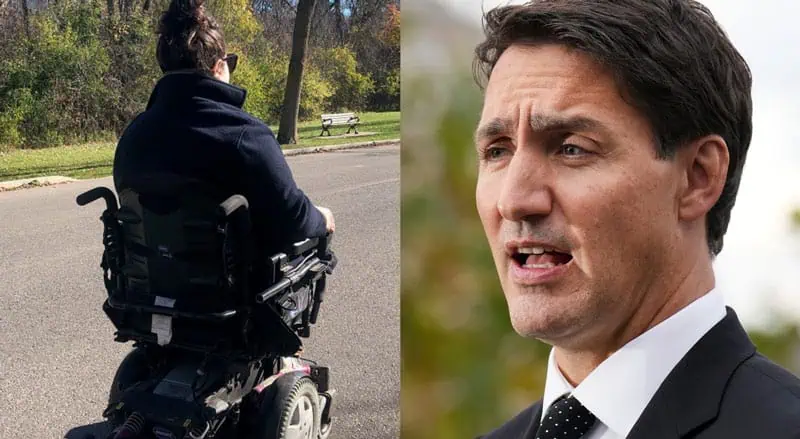The Canadian government is preparing to euthanize a disabled woman because she can’t afford housing that is suitable for her condition.
The disabled 32-year-old woman, known only as Denise to protect her identity, is now in the final stages of the process and is preparing for her medically assisted death appointment.
Doctors will soon pull the plug on Denise after she suffered seven futile years of applying for affordable housing in Toronto.
Denise suffers from a condition known as Multiple Chemical Sensitivity.
Exposure to chemicals that commonly linger in households, like laundry detergents and air fresheners, triggers debilitating symptoms.
Her skin develops rashes, she suffers blinding headaches that can provoke temporary paralysis, and the constant risk of an anaphylactic episode looms over her.
It is possible for a person with her condition to live an almost-normal life if the correct precautions are taken and her home is modified to reduce contamination and exposure.
However, modifying a home in this way and receiving treatment for the condition can be costly.
Yet, for Denise, who is on a low income, securing suitable housing has become a seemingly impossible pursuit.
Due to Denise being unable to afford the right housing for her condition, doctors have put her forward for Canada’s Medical Assistance in Dying (MAiD) program.
Denise’s story first emerged in a CTV National News article published this spring.
The article details her application MAiD.
Denise said the outpouring of public support she received evoked a glimmer of hope for her future.
But now, it’s beginning to dull and she has lost hope of finding a home, leaving her to continue on the path to euthanasia.
“I’ve been given this quasi hope where I see a way that I could survive now … the pieces just aren’t adding up and the money is the clock,” she said.
More than 1,000 donors raised money in the spring to help Denise secure permanent housing in a wheelchair-accessible space with uncontaminated air.
But six months later, she is still searching for a home.
She says her funds are now running out and the clock is ticking as pressure mounts for her to agree to “assisted suicide.”
“I currently have two months left,” Denise said, nodding to her remaining pool of money.
“I have requested final approval for MAiD,” she said.
Denise said there is only final paperwork standing between her and a medically-assisted death.
Funeral arrangements have been made and a power of attorney has been signed.
Once the forms are filed, Denise will enter a 90-day wait period before MAiD takes place.
“It’s the only option,” Denise said.
WATCH:
Slay News has previously reported on Canada’s radical euthanasia laws.
MAiD was legalized in Canada in 2016 for candidates whose natural death was imminent and that wanted to die quickly, rather than live through the pain.
However, it was later amended to include Canadians enduring an “intolerable” and “irreversible” illness, disease, or disability.
The laws are now being expanded to include people with minor conditions, mentally ill patients, and those who are poor or homeless.
A recent case was recently reported in which a man was euthanized against his family’s wishes over a problem with his hearing.
Aside from bouts of depression over his hearing, Alan Nichols, 61, was otherwise healthy.
However, his brother claimed doctors railroaded Nichols into killing himself.
The age limit is also changing to expand the program from adults to also include “mature” children.
Meanwhile, as Canada continues to expand its euthanasia laws, plans to start euthanizing infants are also gaining support.
Recently, Live Action News reported that the Quebec College of Physicians has made a recommendation that infants who experience “grave malformations” where life expectancy is “basically nil” should be eligible for euthanasia under Canada’s Medical Assistance in Dying (MAiD) laws.
A report from the National Post reveals that some parents are already asking for their children to be euthanized.
According to the Post, some Canadian doctors have said, “that specific and explicit requests for MAID have come from parents involving very young children.”
Dr. David Lysecki, a pediatric palliative care specialist at McMaster University’s department of pediatrics said that some parents are seeking death for their child, even though with surgery and life support “we can sometimes keep their body alive for years.
“But that child would never be able to process the outside world in a cognizant way.”
“Some families ask, ‘If they’re going to die at the end of this anyway, maybe three weeks from now, and we don’t believe they’re going to have meaningful positive experiences between then and now, why must we all have to go through this period of waiting,’” he said.
It is now so easy for a person to be euthanized in Canada, that allegations are emerging that the Canadian government-run socialized healthcare system is now euthanizing the country’s sick and poor people rather than treating them.
READ MORE: Canada’s Plans to Euthanize Infants Are Gaining Support

Our comment section is restricted to members of the Slay News community only.
To join, create a free account HERE.
If you are already a member, log in HERE.